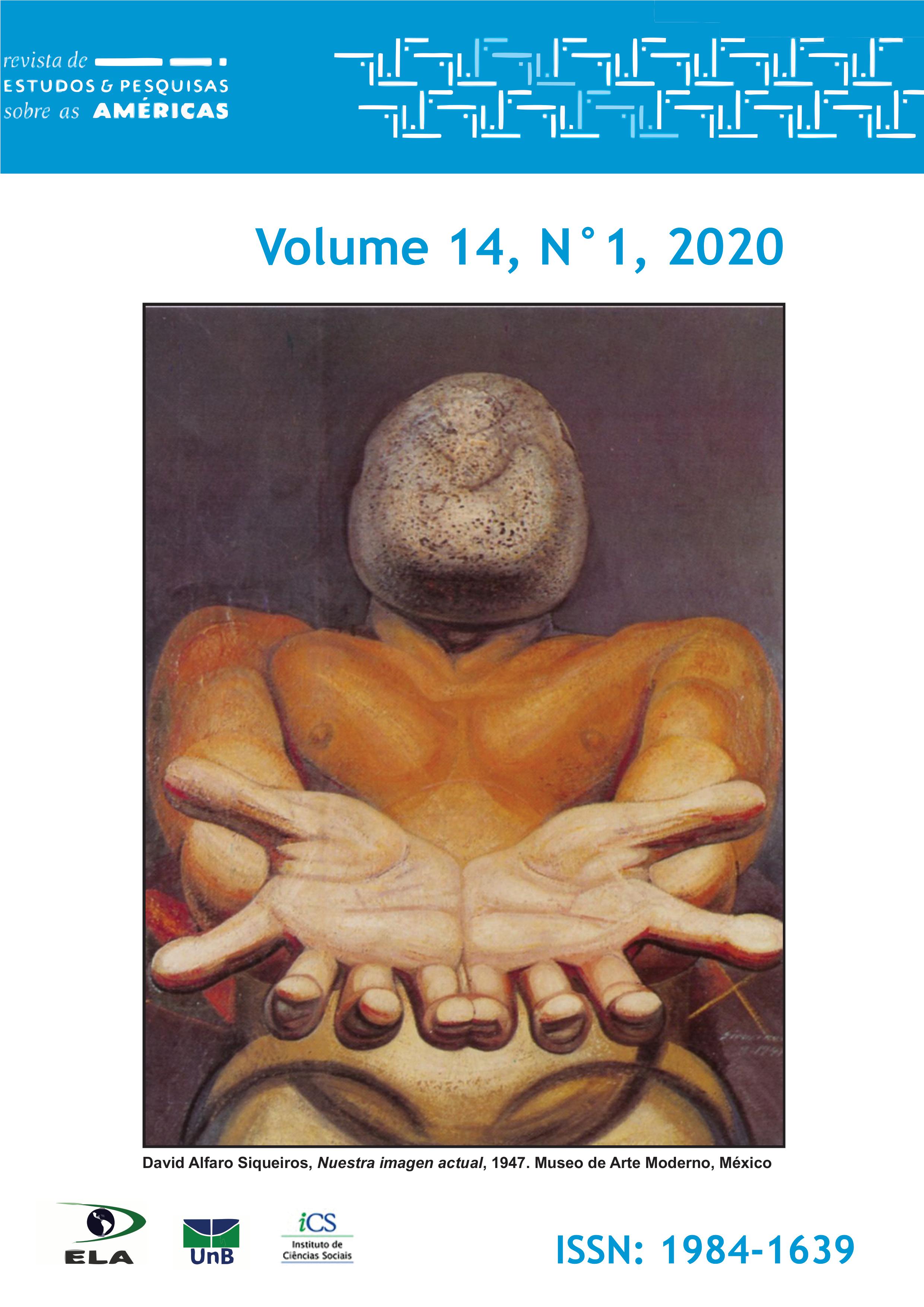Socio-Historical Contextualization of the Brazil-Uruguay border
DOI:
https://doi.org/10.21057/10.21057/repamv14n1.2020.26383Keywords:
Aceguá’s border, documentary research, social-historical contextAbstract
This article aims to prepare a record of Brazil-Uruguay’s border and the border dispute between Portugal and Spain, in order to understand Aceguá’s current context better. To achieve that, a documentary and bibliographic research on the local history and geography has been conducted, besides the analysis of the current conditions of the border development. This is an unprecedented research about Aceguá, including historical information which has not been published before. Therefore, the main focus is to register and to document this community from the conception of what is the border, of the history of the Luso-Spanish border in America and of the current history of Aceguá border.
Downloads
References
ARTEAGA, Juan José. Breve historia contemporánea del Uruguay. 1. ed. Buenos Aires: Fondo de Cultura Económica, 2008.
ABREU, João Capistrano de. Capítulos de história colonial: 1500-1800 & Caminhos antigos e o povoamento do Brasil. 2. ed. Brasília: Ed. Universidade de Brasília, 1998.
AVEIRO, Thais Mere Marques. Relações Brasil-Uruguai: a nova agenda para a cooperação e o desenvolvimento fronteiriço. 2006. Dissertação (Mestrado em Relações Internacionais). Universidade de Brasília, Brasília.
BANDEIRA, Luiz Alberto Moniz. O expansionismo brasileiro e a formação dos Estados na Bacia do Prata: Argentina, Uruguai e Paraguai, da colonização à Guerra da Tríplice Aliança. 3. ed. Rio de Janeiro: Revan; Brasília: Ed. Universidade de Brasília, 1998.
CALÓGERAS, J. Pandiá. Formação Histórica do Brasil. Companhia Editora Nacional. São Paulo, 1972.
CASTROGIOVANNI, Antonio Carlos. Fronteira: Um tema sem limites! In: COSTA, Edgar Aparecido da; COSTA, Gustavo Villela Lima da; OLIVEIRA, Marco Aurélio Machado de (Orgs.). Estudos fronteiriços. Campo Grande, MS: Ed. UFMS, 2010. p. 11-41.
COSTA, Gustavo Villela Lima da. As fronteiras da identidade em Corumbá-MS: Significados, discursos e práticas. In: COSTA, Edgar Aparecido da; COSTA, Gustavo Villela Lima da; OLIVEIRA, Marco Aurélio Machado de (org.). Estudos fronteiriços. Campo Grande, MS: Ed. UFMS, 2010. p. 69-97.
FLICK, Uwe. Introdução à pesquisa qualitativa. Tradução Joice Elias Costa. 3. ed. Porto Alegre: Artmed, 2009, 405p.
GOLIN, Tau. A fronteira: volume 2. Porto Alegre: L&PM, 2004.
HOLANDA, Sergio Buarque de. História geral da civilização brasileira. O Brasil monárquico, tomo II: o processo de emancipação. Por Celia de Barros Barreto [et al.]. 9. ed. v. 3. Rio de Janeiro: Bertrand Brasil, 2003. p. 341-415.
MARCONI, Marina de Andrade; LAKATOS, Eva Maria. Fundamentos de metodologia científica. 5. ed. São Paulo: Atlas, 2003.
LIMA, Oliveira. Formação histórica da nacionalidade brasileira. 3. ed. Rio de Janeiro: Topbooks; São Paulo: Publifolha, 2000. (Grandes nomes do pensamento brasileiro).
PACHECO, Cíntia da Silva. Alternância NÓS e A GENTE no português brasileiro e no português uruguaio da fronteira Brasil-Uruguai (Aceguá). Tese de Doutorado, UnB, 2014.
Documentos sem referência ou sem data
El País, Uruguay y sus 19 departamentos (s/d, pp. 11-12).
Engenheiro Agrônomo Julio Cezar Vinholes Pinto (s/d).
FACCIO, Liane. Prefeito de Bagé luta para não perder Colônia Nova. (s/d)
Lei de 9 de julho de 1862, Art. 1.
Municipio Acegua. 1º de Enero del 2001.
Ricardo Garcia (s/d).
Relato de una vida empresarial (s/d).
TADÊO, Ricardo Williams Garcia. Aceguá ”“ Yaciguay. (elaboração e pesquisa) (s/d).
Documentos regionais ou históricos
ACEGUÁ. 14 anos de emancipação. 10 anos de instalação. Informe comercial, 28 de abril de 2010.
ACEVEDO, Eduardo. Ley nº 765 ”“ “Juncal”. Sala de Senado, Montevideo 17 de abril de 1863.
LENGUAS, Nicolás. Proyecto de Ley. Montevideo, julio 9 de 1862.
LUCAS, Márcia Rodrigues e ZUGE, Tassiane Einhardt. Município de Aceguá. In: Aceguá. 14 anos de emancipação. 10 anos de instalação. Informe comercial, 28 de abril de 2010.
MORELLI, Juan B. Ley nº 10,101. “Pueblo Aceguá”, 1941.
PEDEMONTE, Juan Carlos. Assembléia Geral. Diario El País, 1985.
SIAB. Sistema de Informação de atenção básica. 2009.
TARIGO, Enrique. Ley 15.810. Pueblo Aceguá. 1986.
Sites
http://www.terragaucha.com.br/imags_acegua.htm. Acesso em: 25 fev. 12.
http://www.acegua.rs.gov.br/portal1/intro.asp?iIdMun=100143468. Acesso em: 25 fev. 12.
http://www.acegua.rs.gov.br/portal1/intro.asp?iIdMun=100143468. Acesso em: 25 fev. 12.
http://www.turismoenuruguay.com.uy/informacion_turistica/informacion_turistica_masinfo.php?id=143&secc=informacion_turistica. Acesso em: 27 fev. 12.
http://www.acegua.rs.gov.br/portal1/municipio/historia.asp?iIdMun=100143468. Acesso em: 25 fev. 12.
http://www.brasil.org.uy/br/home/home/index.php?menu=sub1_7&t=secciones&secc=421. Acesso em: 02 mar. 12.
http://monergismo.com/raniere/anabatismo-o-movimento-mais-radical-e-mais-perseguido-da-reforma-protestante/. Acesso em: 29 dez. 12.
Downloads
Published
How to Cite
Issue
Section
License
The published material is the property of the Journal, and may be reproduced in whole or in part with indication of the source.
Copyright: Authors will be responsible for obtaining the copyright of the material used. Authors who publish in this journal agree to the following terms:
a)Authors retain the copyright and grant the journal the right of first publication, with the work simultaneously licensed under
the Creative Commons Attribution License which allows the sharing of work with acknowledgment of authorship and initial publication in this journal.
b) Authors are authorized to take additional contracts separately, for non-exclusive distribution of the version of the work published in this journal (eg, publish in institutional repository or as a book chapter), with acknowledgment of authorship and initial publication in this journal.
c) Authors are allowed and encouraged to publish and distribute their work online (eg in institutional repositories or on their personal page) at any point before or during the editorial process, as this can generate productive changes as well as increase the impact and the citation of the published work (See The Effect of Free Access).
















